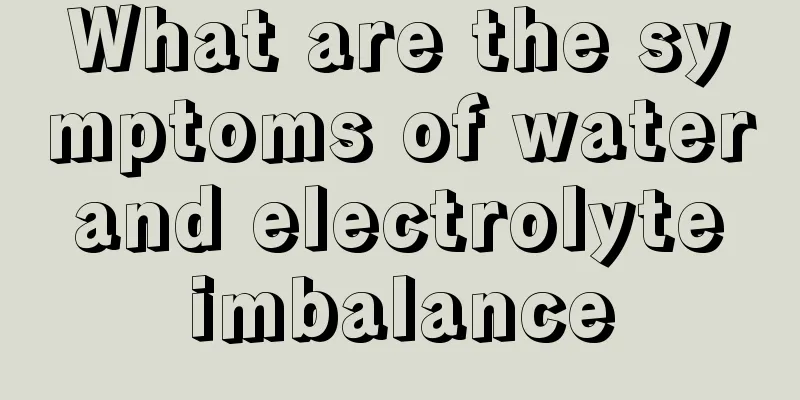What are the symptoms of water and electrolyte imbalance

|
Water and electrolyte disorders often manifest as hypernatremia, hyponatremia, and hyperkalemia. These diseases and problems can easily have adverse effects on human health, leading to symptoms such as headaches, dizziness, nausea, vomiting, and chest tightness. 1. Hypernatremia The clinical manifestations are atypical and fatigue may occur. Dry lips and tongue, loss of skin elasticity, irritability, and even mania, hallucinations, delirium and coma. Brain atrophy caused by hypernatremia may be followed by cerebral hemorrhage, subarachnoid hemorrhage, and even death. 2. Hyponatremia Mild hyponatremia (serum sodium concentration 120-135mmol/L) may cause loss of taste and muscle aches; moderate hyponatremia (serum sodium concentration 115-120mmol/L) may cause headache, personality changes, nausea, vomiting, etc.; severe hyponatremia (serum sodium concentration <115mmol/L) may cause coma and loss of reflexes. 3. Hyperkalemia It manifests in three aspects: ① Severe physical symptoms such as bradycardia, atrioventricular block and even sinus arrest. The electrocardiogram shows tall and sharp T waves. In severe cases, the PR interval is prolonged, the P wave disappears, the QRS wave widens, and eventually the heart stops beating. In the early stage, the blood pressure increases slightly, and in the later stage, the blood pressure decreases, and there are irregular breathing and arrhythmias. ② Neuromuscular symptoms manifest in the early stages as muscle pain and weakness, and when the symptoms are most severe in the extremities, respiratory muscle paralysis may occur. ③ Early manifestations of mental symptoms include apathy, slow response to the outside world, excitement, emotional instability, restlessness, etc. In severe cases, there will be impaired consciousness, drowsiness, coma, etc. 4. Hypokalemia It is not only related to the concentration of serum potassium, but also closely related to the speed of hypokalemia. Therefore, in patients with slow onset, although hypokalemia is severe, the clinical symptoms may not be obvious. On the contrary, in patients with acute onset, although hypokalemia is not severe, the clinical symptoms may be very significant: ① Physical symptoms include lack of appetite, abdominal distension, thirst, nausea, vomiting, chest tightness, palpitations, and severe myocardial involvement, which can lead to heart failure. The initial electrocardiogram shows flat or absent T waves and the appearance of U waves. In severe cases, ventricular tachycardia, ventricular fibrillation or sudden death may occur. ② Neuromuscular symptoms are the most prominent symptoms of hypokalemia, and the important manifestations are decreased muscle strength and weakness in the limbs, flaccid paralysis and periodic paralysis. ③ Early manifestations of mental symptoms include fatigue, emotional indifference, memory loss, depression, and stupor. In severe cases, there may be impaired consciousness, drowsiness, delirium and even coma. 5. Hypercalcemia Slow reaction, indifference to the outside world, emotional indifference and memory impairment; there may also be symptoms such as hallucinations, delusions, depression, etc.; in severe cases, there may be consciousness disorders such as drowsiness and coma. |
<<: What to do if acid-base imbalance occurs
>>: What kind of people are prone to altitude sickness?
Recommend
Patients must be treated in combination with the clinical manifestations of nasopharyngeal carcinoma
Nasopharyngeal carcinoma is a malignant tumor of ...
Causes of herpes
There are seven reasons for herpes: acantholysis,...
How long does it take for a patient with advanced liver cancer to go from lethargy to death
Generally speaking, it is uncertain how long it t...
What to do if formaldehyde exceeds the standard in kindergarten
If the formaldehyde level exceeds the standard in...
What DPM value is considered gastric cancer? About 70%
If DPM reaches 70%, it is possible that the patie...
What will happen if you have bile duct cancer?
Cholangiocarcinoma is a malignant tumor. Many pat...
How to treat allergic eczema?
Allergic eczema is a common inflammatory skin dis...
How to treat myofascial pain syndrome
Myofascial pain syndrome requires timely treatmen...
What are the commonly used tests for prostate cancer staging? Seven methods to check prostate cancer
Nowadays, more and more male friends suffer from ...
Does allergic purpura itch?
Henoch-Schonlein purpura is not unfamiliar to man...
Can white vinegar and flour remove spots?
When spots appear on your face, you will become v...
How to choose a safer baby bottle
The baby bottle is an item that everyone is famil...
The difference between chives and shallots
Chives and scallions are both common condiments i...
How to distinguish the grades of diamonds
Diamond is a very expensive jewelry. Because diam...
Black stuff comes out of ears
In daily life, many people do not clean their ear...









